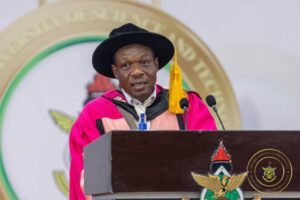African countries must collectively work to preserve their natural resources and diverse ecosystems – Prof. Bugri

Professor John Tia Bugri, Provost, College of Art, and Built Environment, at the Kwame Nkrumah University of Science and Technology (KNUST) has stressed urgent need for African countries to endeavor to collectively work to protect natural resources on the continent.
He said natural resources and diverse ecosystems in Africa were finite and vulnerable, and there was the need for effective collaboration and collective efforts by all to protect and preserve them.
“The impact of climate change is already being felt across the continent, with rising temperatures, extreme weather events, and dwindling water resources.
As custodians of the environment, it is our responsibility to adopt sustainable practices, promote renewable energy sources, and develop innovative solutions to mitigate the effects of climate change,” he charged.
Professor Bugri was speaking at the opening of 1st International Conference on Environment, Social, Governance and Sustainable Development of Africa (ICESDA) 2024 in Kumasi.
The three-day programme was held under the theme “Enhancing Environment, Social, Governance and Sustainability for Africa’s Development.”
Prof. Tia Bugri indicated that, the social dimension of sustainable development could not be overlooked, citing Africa as a continent with immense human potential which needed to invest in the people, particularly in education, healthcare, and social welfare.
He said ensuring access to quality education and healthcare for all, could empower individuals to lead fulfilling lives and contribute meaningfully to society.
Additionally, addressing social inequality and promoting inclusivity were vital for fostering social cohesion and harmony.
The Provost underscored the need for Africa to further work to improve governance despite the significance strides made in the sector and advance the cause of fighting corruption, enhancing efficiency of public institutions and create enabling environment for businesses and investment.
Prof. Tia Bugri mentioned that the KNUST recognizing the importance of research, innovation, and collaboration in addressing the environmental, social, and governance challenges facing Africa, was committed to producing knowledge and solutions to drive sustainable development.
Through partnerships with other academic institutions, government agencies, and the private sector, the university was fostering interdisciplinary research, knowledge exchange, and capacity building.
Prof. De-Graft Owusu-Manu, President of Green Communities International and Chairman of ICESDA 2024, highlighting on the aim of the Conference, said it was a clarion response to the growing demand for all organizations, higher education institutions, companies, and stakeholders to engage in growth and sustainable practices and community development projects.
The conference brought together scholars, Environment, Social and Governance (ESG) practitioners and decision makers around the globe, to discuss innovative pathways to transform the world into a sustainable and livable place.
Speakers delivered on topics such as social innovations, entrepreneurship and indigenous knowledge management in Africa, sustainable innovations in the built environment ecosystem in Africa, sustainable innovations in urban configuration mobility in Africa, among others.
Source: GNA
